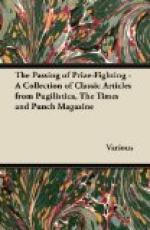* * * * *
MORE WORK FOR HIS MAJESTY’S JUDGES.
“Potato disease has unfortunately made its appearance in the —— district, the early and second early crops being seriously attacked. The late crops are free from disease up to the present, and it is hoped by judicial spraying to save them.”—Local Paper.
* * * * *
From an interview with the Superintendent of Regent’s Park:—
“‘People seem surprised,’ he said, ’when I tell them that within a few minutes’ walk of Baker Street Station, and the incessant din of Marylebone Road, such birds as the cuckoo, flycatcher, robin and wren have reared their young.’”—Observer.
To hear of the cuckoo bringing up its own family in any circumstances was, we confess, a little bit of a shock.
* * * * *
“‘Idling, my dear
fellow!’ was Mr. Jerome K. Jerome’s decisive
answer
to my question: ‘What
do you most like doing at holiday-time?’
’But if, and only when,
I am really driven to exertion, let me have a
horse between my legs, a pair
of oars, and a billiard-table, and I ask
nothing more of the gods.’”—Answers.
The next time Mr. JEROME indulges in this performance may we be there to see.
* * * * *
[Illustration: THE LEAGUE OF YOUTH.
WAR-WEARY WORLD (at the Jamboree). “I
WAS NEARLY LOSING HOPE, BUT THE
SIGHT OF ALL YOU BOYS GIVES IT BACK TO ME.”]
* * * * *
ESSENCE OF PARLIAMENT.
Monday, July 26th.—When the Peers were about to discuss the Law of Property Bill, which seeks to abolish the distinction between land and other property, Lord CAVE dropped a bombshell into the Committee by moving to omit the whole of Part I. Lords HALDANE and BUCKMASTER were much upset and loudly protested against the proposal to cut out “the very heart and substance of the measure.” The LORD CHANCELLOR was less perturbed by the explosion and was confident that after further discussion he could induce the CAVE-dwellers to come into line with modern requirements. Thirty-four clauses thus disappeared with a bang; and of the hundred and odd remaining only one gave much trouble. Objection was taken to Clause 101, granting the public full rights of access to commons, on the grounds inter alia that it would give too much freedom to gipsies and too little to golfers. Lord SALISBURY, who, like the counsel in a famous legal story, claimed to “know a little about manors,” was sure that only the lord could deal faithfully with the Egyptians, but, fortified by Lord HALDANE’S assurance that the clause gave the public no more rights and the lords of the manor no less than they had before, the House passed it by 42 to 29.
Mr. BRIDGEMAN, for the Board of Trade, bore the brunt of the early questioning in the House of Commons. He sustained with equal imperturbability the assaults of the Tariff Reformers, who asserted that British toy-making—an “infant industry” if ever there was one—was being stifled by foreign imports: and those of the Free Traders, who objected to the Government’s efforts to resuscitate the dyeing trade.




